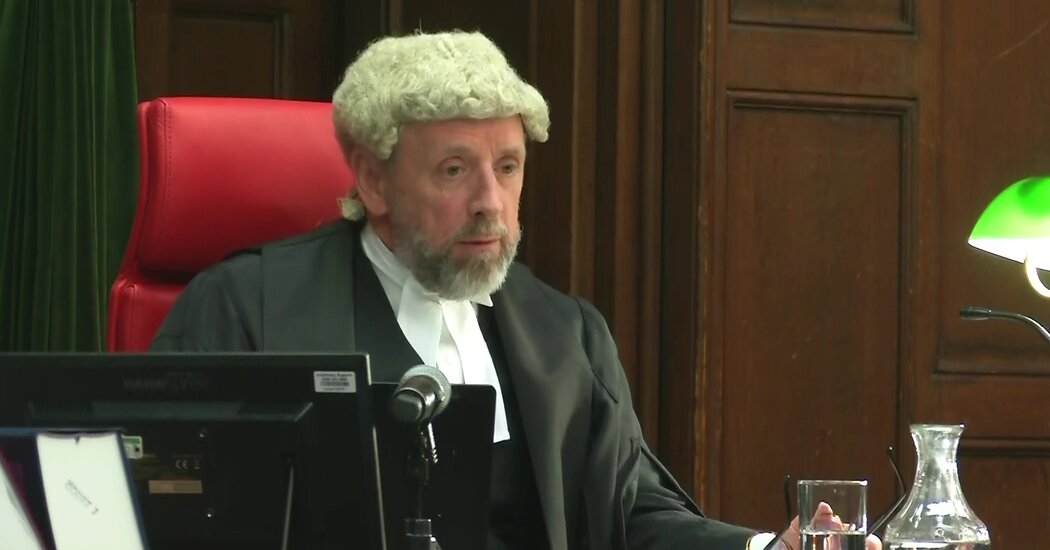A British man who served 38 years in prison for murder had his conviction overturned on Tuesday after forensic evidence from the crime scene was tested and found not to match his DNA.
The man, Peter Sullivan, 68, is thought to be the victim of the country’s longest miscarriage of justice involving a living prisoner. The judgment follows the emergence of several other wrongful convictions in recent years, casting a shadow over the reputation of Britain’s criminal justice system and raising grave questions about the credibility of the appeals process.
Mr. Sullivan was imprisoned after the killing in August 1986 of Diane Sindall, 21, who suffered a frenzied sexual attack in Birkenhead, near Liverpool, as she made her way home from a pub where she also worked.
After DNA evidence was presented in the case, the Court of Appeal overturned Mr. Sullivan’s conviction.
“In the light of that evidence, it is impossible to regard the appellant’s conviction as safe,” said Timothy Holroyde, one of three judges presiding over the hearing. “We quash the conviction,” he added, ordering that Mr. Sullivan be released from custody.
Appearing via a video link from prison in Wakefield, West Yorkshire, Mr. Sullivan broke down in tears and held his hand over his mouth as he was told he would be freed, the BBC reported.
In a statement read by his lawyer, Sarah Myatt, on his behalf after the ruling, Mr. Sullivan said, “What happened to me was very wrong, but it does not detract or minimize that all of this happened off the back of a heinous and most terrible loss of life.” He added: “I am not angry; I am not bitter. I am simply anxious to return to my loved ones and family as I’ve got to make the most of what is left of the existence I am granted in this world.”
Mr. Sullivan’s wrongful imprisonment will most likely intensify the debate over the reliability of Britain’s Criminal Cases Review Commission, which is responsible for investigating possible miscarriages of justice.
In 2023, Andrew Malkinson, who spent 17 years in prison for a rape he did not commit, was freed after years of protesting his innocence.
James Burley, who led the investigation into Mr. Malkinson’s case by a charity, Appeal, said in a statement on Tuesday, “Peter Sullivan’s exoneration today after nearly four decades of wrongful imprisonment provides further evidence that our current appeals system cannot be trusted to swiftly identify and rectify miscarriages of justice.”
Ms. Sindall, who was a florist and was engaged to be married, was attacked while walking to a gas station in Bebington, Merseyside, after her van broke down just after midnight.
Twelve hours later, Ms. Sindall’s body was discovered by a member of the public in an alleyway with extensive injuries. The cause of death was established as a cerebral hemorrhage following multiple blows.
The hunt for her killer gained nationwide attention and, because of the brutality of the assault, tabloid newspapers referred to Mr. Sullivan after his conviction as the “Beast of Birkenhead.”
Mr. Sullivan applied in 2008 for his case to be reviewed by the Criminal Cases Review Commission, but his application was rejected. He applied for permission to appeal in 2019, but that, too, was turned down.
After another application was lodged in 2021, the commission decided that, because of technological advances, it was worth testing the semen samples preserved from the crime scene in 1986. They did not match Mr. Sullivan’s DNA.
The police, who have since reopened their investigation into the case, say that more than 260 other men have since been screened and eliminated from their inquiry.
“Our thoughts remain with the family and friends of Diane Sindall who continue to mourn her loss and will have to endure the implications of this new development so many years after her murder,” Detective Chief Superintendent Karen Jaundrill of the Merseyside Police said in a statement on Tuesday. “We are committed to doing everything within our power to find whom the DNA, which was left at the scene, belongs to.”
After his arrest, Mr. Sullivan was initially denied legal representation and confessed to the murder before retracting it. He has long protested his innocence, a factor that makes it harder to get parole.
In a statement, the Criminal Cases Review Commission said that “the new DNA evidence that has led to Mr. Sullivan’s conviction being quashed could not have been available when we first considered his case,” which, it said, justified its decision not to send this case back to the courts in 2008.
It added, “However, we do regret that we were not able to identify Mr. Sullivan’s conviction as a potential miscarriage of justice in our first review.”


